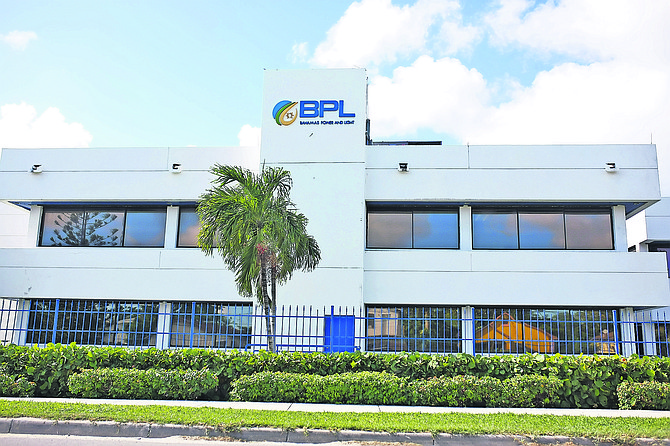By NEIL HARTNELL
Tribune Business Editor
nhartnell@tribunemedia.net
Financial services providers have complained that Bahamas Power & Light’s (BPL) unreliability impacted staff productivity during the COVID-19 crisis.
Charles Littrell, the Central Bank’s inspector of banks and trust companies, disclosed in his 2020 second quarter supervisory letter that the concerns were revealed in a survey of 72 Bahamas-based financial institutions that was undertaken to better understand COVID-19’s impact on the industry.
“Respondents noted challenges with local utility dependability, which decreased productivity of some work-at-home staff,” Mr Littrell wrote in a thinly-veiled reference to BPL.
While showing that BPL still faces much work in being able to provide consistent energy supply, the Central Bank executive added all international financial institutions “were able to continue offering reasonable service levels to their clients” during the height of the pandemic’s lockdown.
“As for income and capital risk, respondent financial impacts were aligned with their exposures. Those with interest income exposure and fee income based on assets under management reported revenue concerns,” Mr Littrell said.
“Those with substantial asset portfolios, not supported by group structures, reported concerns with asset devaluation. Many respondents expressed concern over the unknown nature of the future economic conditions, especially those supervised financial institutions exposed to market risk (in particular, interest rate risk).”
Elsewhere, Mr Littrell said the Central Bank remained confident that The Bahamas will maintain sufficient foreign currency reserves to support the one:one US dollar peg for the foreseeable future.
He revealed that the reserves stood at $2.08bn at end-June 2020, some 33 percent higher at the same point last year, when they stood at $1.56bn. Mr Littrell added that they were also slightly higher than the $1.97bn mark achieved at end-February 2020 just prior to the COVID-19 outbreak.
“The COVID-19 outbreak is a substantial economic challenge, but has yet to place appreciable pressure on the external reserves position,” the Central Bank official wrote. “The reduction in economic activity since March has materially reduced foreign exchange outflows.
“There is also the consideration that the Central Bank retains several policy tools, which it will deploy in need, to preserve the external reserves position. The Central Bank expects to allow some run-down in the external reserves from the current historic highs to finance necessary imports and to support high-value developments in the tourism sector.
“These developments will stand the country and economy in good stead when tourist traffic eventually returns to more normal levels. The Central Bank remains confident that it will retain sufficient reserves to maintain the Bahamian dollar/US dollar peg.”
Mr Littrell’s remarks echo those contained in the Central Bank’s monthly economic report for May, which was released earlier this week, disclosing that the foreign currency reserves were maintained at around $2bn through the peak of the COVID-19 lockdown.
The report revealed that the reserves, which are critical to both funding imports and securing the one:one peg with the US dollar, closed May at a still-relatively healthy $1.972bn ahead of a forecast $1bn drawdown over the remainder of 2020 as businesses and the economy re-open.
The Central Bank data shows they are greater than prior year levels, having expanded by almost $214m over the first five months of 2020, and said: “External reserve balances are projected to contract during the year on account of a decline in foreign currency inflows related to tourism sector activity, and a rise in imports to aid [Hurricane Dorian] reconstruction work.
“Nevertheless, external balances are estimated to remain more than adequate to sustain the Bahamian dollar currency peg.”





Comments
OMG 5 years, 7 months ago
Interestingly enough some citizens who do not pay their bills have flashy cars and trucks or take frequent trips to Miami, before paying bills. With regard to the government shortage of money in my experience the previous deputy director would have a nice trip to Cuba to hire teachers whilst unemployed Bahamian teachers are waiting and waitingto be employed, or the mad cap schemes such an paying an american company to initiate a computerised report card system ( now defunct) for MOE schools or even better the scheme paid for to have all practical subjects on a rotating subject system, so students did woodwork, then all changed to do Tech drawing, then cookery and so on. Reps came over from the USA, free tee shirts etc.Never worked because it necessitated a large building so subjects could be taught each module . Another expensive scheme abandoned. Failed hospital in Palmetto Point where at great expense purchase of land from local MP and clearing created nothing more than a huge pile of curry. So many ill thought out schemes paid for and abandond is one part of why the Bahamas is somdeep in debt.
Sign in to comment
OpenID